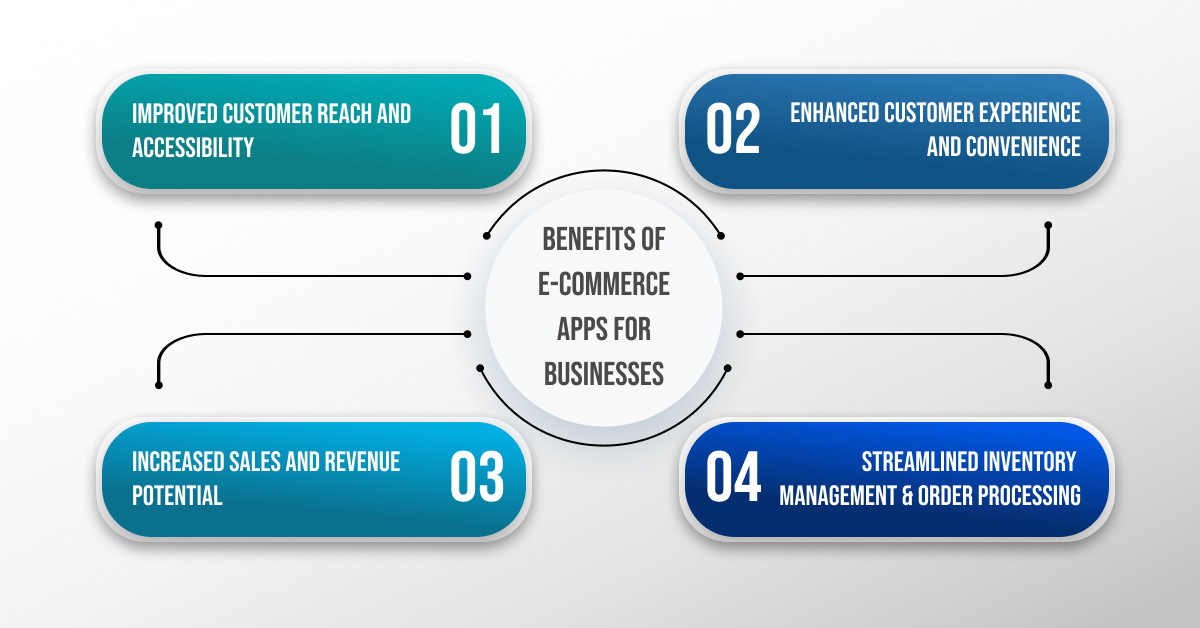
Is Your Business Ready for the E-Commerce App Revolution?
-
By Amardeep Singh Sandhu
-
6th July 2023
E-commerce apps is a powerful tool that offers a convenient and accessible platform for customers to browse and purchase products or services with just a few taps on their smartphones. This blog explores the significance of e-commerce apps for businesses and sheds light on the transformative e-commerce app revolution. So, let’s dive in!
Understanding the E-commerce App Revolution
The e-commerce app revolution signifies a significant shift in how businesses operate and engage with customers. Additionally, it refers to the widespread adoption and utilization of mobile applications designed for e-commerce. These apps have revolutionized how consumers interact with businesses, transforming the entire business landscape.
With the rapid advancement of technology and the increasing reliance on smartphones, e-commerce apps have become a vital tool for businesses to establish an online presence and reach a more extensive customer base. These apps offer a seamless and personalized shopping experience, allowing customers to browse products, make purchases, track orders, and receive notifications at their fingertips.
Furthermore, the e-commerce app revolution has accelerated businesses’ digital transformation, necessitating modern technologies and strategies. It has pushed businesses to optimize their online presence, enhance customer experience, and streamline operations to remain competitive in the digital era.
Benefits of E-commerce Apps for Businesses:

1. Improved Customer Reach and Accessibility: E-commerce apps open up new avenues for businesses to reach a wider audience. With a well-designed app, businesses can tap into the growing number of mobile users and expand their customer base beyond geographical limitations. Apps provide 24/7 accessibility, allowing customers to browse and make purchases conveniently. This increased reach and accessibility translate into greater visibility and potential for business growth.
2. Enhanced Customer Experience and Convenience: E-commerce apps provide a seamless and user-friendly shopping experience for customers. They offer personalized product recommendations, advanced search options, and tailored notifications, creating a highly personalized and convenient shopping journey. Apps also enable easy and secure payment options, saving customers from the hassle of entering payment details repeatedly. Businesses can foster loyalty, improve customer satisfaction, and drive repeat purchases by focusing on a customer-centric approach.
3. Increased Sales and Revenue Potential: By leveraging the power of e-commerce apps, businesses can significantly boost their sales and revenue potential. Apps provide a direct and frictionless channel for customers to purchase, eliminating the need to visit physical stores or websites. Push notifications and personalized offers can drive impulse buying and increase sales conversion rates. Moreover, apps allow businesses to leverage data analytics and track customer behavior, enabling targeted marketing strategies to drive sales further.
4. Streamlined Inventory Management and Order Processing: E-commerce apps streamline inventory management and order processing, improving efficiency and reducing operational costs. Real-time inventory tracking ensures accurate product availability information, preventing overselling or out-of-stock situations. Automated order processing and integration with backend systems simplify the fulfillment process, reducing manual errors and ensuring timely delivery. This efficient inventory and order management improves customer satisfaction and operational effectiveness.
Assessing Your Business’s Readiness
Identifying Your Target Audience and Market Niche:
Before diving into the e-commerce app revolution, it’s crucial to identify your target audience and market niche. Understand who your ideal customers are, their preferences, and their online shopping behaviors. Analyze the market demand for your products or services and assess if there is a viable customer base that can be reached through an e-commerce app. This evaluation will help you determine your app venture’s potential success and profitability.
Evaluating Your Product or Service Suitability for eCommerce Apps:
Not all products or services are ideally suited for e-commerce apps. Evaluate the nature of your offerings and assess if they can be effectively showcased and sold through a mobile app interface. Consider factors such as complexity, customization requirements, and the need for physical interaction. Products easily described, displayed visually, and shipped without complications fare well in e-commerce apps. On the other hand, highly specialized or customized products may require additional considerations.
Analyzing Your Existing Online Presence and Infrastructure:
Assess your online presence and infrastructure to gauge your readiness for an e-commerce app. Evaluate the performance and user experience of your website if you have one. Analyze your existing backend systems and processes for inventory management, order fulfillment, and customer support. Determine if your infrastructure can seamlessly integrate with an e-commerce app or if updates and enhancements are needed. This analysis will help identify gaps or improvement areas to ensure a smooth transition into the app environment.
Critical Considerations in E-commerce App Development:
Choosing Between a Custom-Built App or a Ready-Made Solution:
One of your first decisions is whether to develop a custom-built app or opt for a ready-made solution. Custom-built apps offer more flexibility and tailored features but require more time and resources. On the other hand, ready-made solutions provide a faster and more cost-effective option but may need more customization. Consider your business needs, budget, and timeline to determine the best approach for your e-commerce app development.
Selecting the Right Platform and Technology Stack:
Choosing the right platform and technology stack is vital for the success of your e-commerce app. Consider target audience demographics, device compatibility, and scalability requirements. Popular platforms like iOS and Android offer a broad user base, while cross-platform frameworks like React Native and Flutter provide cost-effective development options. Additionally, selecting the appropriate technology stack, including programming languages, frameworks, and databases, will ensure the app’s performance, security, and scalability.
Integrating Essential Features such as Secure Payment Gateways and Inventory Management:
To create a seamless shopping experience for your customers, it is essential to integrate critical features into your e-commerce app. These include secure payment gateways to facilitate smooth and safe transactions, inventory management systems to track product availability and streamline order fulfillment, and customer relationship management tools to enhance customer interactions and support. Prioritize features based on your business requirements and customer expectations to provide a robust, user-friendly app.
Ensuring Responsive Design and Mobile Optimization:
With most online users accessing websites and apps through mobile devices, ensuring the responsive design and mobile optimization in your e-commerce app is crucial. A responsive design adapts to different screen sizes, providing a consistent and optimized user experience across devices. Mobile optimization focuses on fast loading times, intuitive navigation, and touch-friendly interfaces. By prioritizing these aspects, you can enhance user engagement, reduce bounce rates, and increase conversion rates for your e-commerce app.
Planning and Implementing Your E-commerce App Strategy:
Setting Clear Goals and Objectives:
Before diving into the development process, it is crucial to establish clear goals and objectives for your e-commerce app. Determine what you want to achieve with the app: increasing sales, improving customer engagement, or expanding your market reach. Clear goals will guide your decision-making and ensure your app aligns with your business strategy.
Creating a Comprehensive Project Plan and Timeline:
A well-structured project plan is essential for successfully implementing your e-commerce app strategy. Break down the development process into manageable tasks, allocate resources, and set realistic timelines. This will help you stay organized, monitor progress, and ensure timely milestone completion.
Collaborating with Experienced App Developers or Agencies:
To bring your e-commerce app vision to life, collaborate with experienced app developers or agencies. Look for professionals specializing in e-commerce app development with a proven track record. Their expertise and knowledge will be invaluable in creating a high-quality and user-friendly app that meets your business needs.
Testing, Launching, and Marketing Your E-commerce App:
Once the development is complete, thoroughly test your app to identify and fix any bugs or usability issues. After testing, it’s time to launch your app in the app stores. Develop a comprehensive marketing strategy to promote your app and attract users. Utilize various channels, such as social media, email marketing, and paid advertising, to generate awareness and drive downloads.
Conclusion: Encouragement for Businesses to Seize the Opportunity
As we have explored the benefits of e-commerce apps, assessed business readiness, and delved into key considerations in app development, it becomes clear that businesses need a reliable and experienced partner to navigate this journey.
That’s where Deftsoft, a leading web and mobile development company, comes into play. With our expertise in mobile app development, we can help businesses seize the opportunity presented by the e-commerce app revolution. Our skilled and professional developers are well-versed in creating stunning and functional mobile apps for both Android and iOS platforms. We understand the complexities of mobile app development and can bring your app idea to life.
Recent Articles
-

Unity vs Unreal Engine 5: Which is Better?
-

Non-Negotiable Tips for Developing a P2P Lending Platform
-

The 8 Leading Cross-Platform App Development Frameworks You Should Know
-

Step-by-Step Guide: How to Build a dApp on Ethereum with Ease
-

Why Does Your Business Need Blockchain Development Company’s Expertise?

Amardeep Singh Sandhu
 6th July 2023
6th July 2023